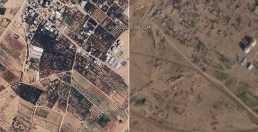The analysis suggests that the U.S. war in Somalia was waged with no clear legal basis.
by Nick Turse, The Intercept
The United States has fought more than a dozen “secret wars” over the last two decades, according to a new report from the Brennan Center for Justice at New York University’s School of Law. Through a combination of ground combat, airstrikes, and operations by U.S. proxy forces, these conflicts have raged from Africa to the Middle East to Asia, often completely unknown to the American people and with minimal congressional oversight.
“This proliferation of secret war is a relatively recent phenomenon, and it is undemocratic and dangerous,” wrote Katherine Yon Ebright, counsel in the Brennan Center’s Liberty and National Security Program. “The conduct of undisclosed hostilities in unreported countries contravenes our constitutional design. It invites military escalation that is unforeseeable to the public, to Congress, and even to the diplomats charged with managing U.S. foreign relations.”

These clandestine conflicts have been enabled by the 2001 Authorization for Use of Military Force, enacted in the wake of the September 11 attacks, as well as the covert action statute, which allows secret, unattributed operations, primarily conducted by the CIA. The United States has also relied on a set of obscure security cooperation authorities that The Intercept has previously investigated, including in an exposé earlier this year that revealed the existence of unreported U.S. counterterrorism efforts in Egypt, Lebanon, Syria, and Yemen. Ebright documents so-called 127e programs, known by their legal designation, in those countries and 12 others: Afghanistan, Cameroon, Iraq, Kenya, Libya, Mali, Mauritania, Niger, Nigeria, Somalia, and Tunisia, as well as a country in the Asia-Pacific region that has not yet been publicly identified.
Recent Posts
What To Do When You See ICE In Your Neighborhood
July 14, 2025
Take Action Now How can you deter the Trump administration’s immigrant deportation machine when it pops up in your community? Follow these…
ICE Campaign Of Violence Will Lead To More Deaths
July 14, 2025
Take Action Now Jaime Alanis’s death shows the horrific consequences of a secret police force behaving with utter impunity.By Natasha Lennard, The…
Hague Group: “Concrete Measures” or Sack of Cement? Will It Move to Sanctions, Peace Force and Ensuring Aid to Gaza?
July 13, 2025
Take Action Now Will the meeting in Colombia be a coalescence of global opinion driving states to just action — or just more rhetoric from various…
Why Are Democratic Lawmakers Still Meeting With Netanyahu?
July 12, 2025
Take Action Now Pictures show Democrats like Chuck Schumer standing next to Netanyahu, smiling.By Sharon Zhang, Truthout A bipartisan group of…




